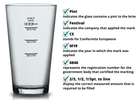
What Does The M And Other Markings On A Pint Glass Mean?


Do you know that you actually get more beer when your pint glass has an M and other markings on it? On the other hand, how would you feel if you are served beer without the head? It is common knowledge that beer is not beer without the head. So, what would you choose? A full pint of beer without the head or 1 ounce less of beer with a head?
Mundane as it may sound but there is an actual British court ruling in 1982 that stipulated that the head is part of a serving of beer that should not be without. As long as it does not occupy half of the glass, that is.
Backed by Campaign for Real Ale (CAMRA), a consumer group with its 190,000 strong members, complainants filed a case in court regarding pub owners who short serve their patrons with less than a pint of the beer that they pay for. One more scrupulous practice to blatantly short serve patrons is to use a glass that is smaller than the 20-ounce pint glass. 
However, the pub owners argued that getting new glasses to serve the 100% liquid portion of beer means spending millions that they cannot afford on beer alone. As a solution, the parliament promised to pass legislation for a pint of beer to contain 95% of liquid beer, leaving the 5% for the head. To make a more tangible point on that, the head should not be wider than the width of your pinkie. What if the pub owner has a larger pinkie and you have a smaller one?
CAMRA was not happy with the decision, claiming that the ruling goes against the Weights and Measures Act of 1985 stipulating that a pint of beer should indeed measure a pint. To solve the issue of short serving, all licensed pubs must have a stamp on their glasses to certify that these glasses are at par with the standards.
Before 2006, the markings found on a pint glass was a crown and a number that signifies where it was certified. The markings which started in 1699 were meant to assure beer drinkers that they are not short served of their beer. However, since the crown is a UK mark, it is inappropriate to use it all over the European Union. Yet the replacement crown with the CE mark was not authorized. Instead, as CAMRA puts it, it was done by stealth, meaning the change had been slow that nobody bothered to react. There are still crown-stamped glasses but are no longer in production.
The word PINT indicates that 1 pint (20 ounces) of beer should reach the brim of the glass. However, due to the 95% liquid beer plus 5% head (froth) guideline approved by the consumers and the pub owners, do not assume that the full to the brim will be all 100% beer.
The CE mark stands for Conformité Européene (lit. European Conformity). The CE mark is already used in other EU products so that the union found that there is no need to make a different one. Aside from this, most of the pint glasses are now produced either in Belgium or France, both French-speaking countries, so the marking is only appropriate.
The M plus number in a rectangular box stands for Measure and the year it was marked. In this example, the glass has an M19 mark, meaning it has been measured in 2019 to contain 1 pint of beer.
The number beside the M# indicates the registration number of the Inspectorate and 0846 means it was marked in the Welsh principal area. Thus, a glass measured and marked in West Sussex will have the mark 0883 while a glass measured and marked in Dorset will have the mark 1020.
The line just above this marking indicates the respective measures on this glass. For this, the liquid beer should be up to this line and the froth above this. 
Short measures of 1oz may not be much but if the pub can serve 20 short-measured pints of beer, then he earns another pint of beer already paid by the other customers who got only 19 ounces of their beer. A regulation like this ensures that the customers get what they paid for and the pub owner sleeps at night knowing he had an honest day at work.
Check out our monthly free samples or sign up to our free VIP club to avail of our exclusive rebate program. No credit cards required. No need to purchase anything. We just want to say thank you.
